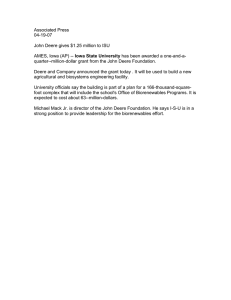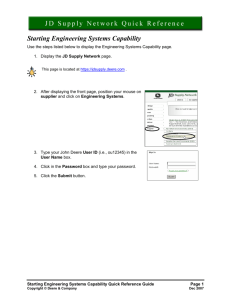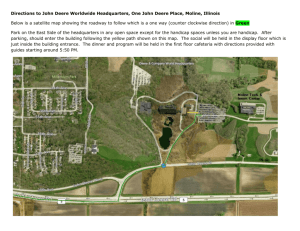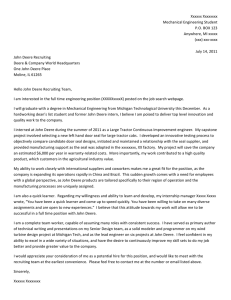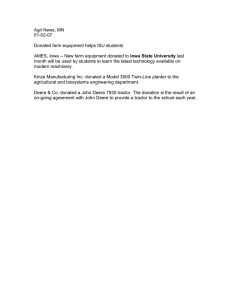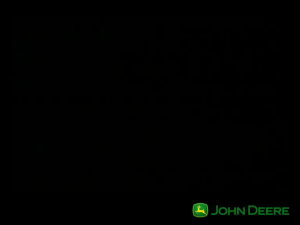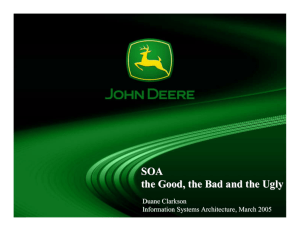TO: HU3120 Instructor FROM: HU3120 Student DATE: July 20, 2011 SUBJECT: Decisions Involved in Creating My Career Documents
advertisement
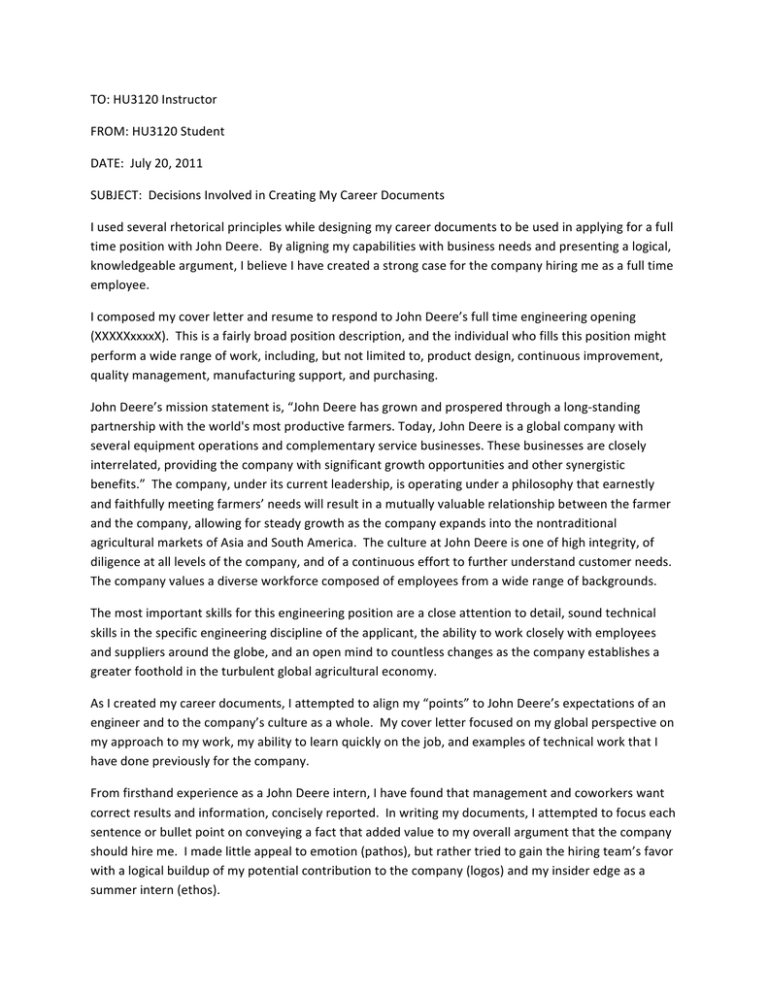
TO: HU3120 Instructor FROM: HU3120 Student DATE: July 20, 2011 SUBJECT: Decisions Involved in Creating My Career Documents I used several rhetorical principles while designing my career documents to be used in applying for a full time position with John Deere. By aligning my capabilities with business needs and presenting a logical, knowledgeable argument, I believe I have created a strong case for the company hiring me as a full time employee. I composed my cover letter and resume to respond to John Deere’s full time engineering opening (XXXXXxxxxX). This is a fairly broad position description, and the individual who fills this position might perform a wide range of work, including, but not limited to, product design, continuous improvement, quality management, manufacturing support, and purchasing. John Deere’s mission statement is, “John Deere has grown and prospered through a long‐standing partnership with the world's most productive farmers. Today, John Deere is a global company with several equipment operations and complementary service businesses. These businesses are closely interrelated, providing the company with significant growth opportunities and other synergistic benefits.” The company, under its current leadership, is operating under a philosophy that earnestly and faithfully meeting farmers’ needs will result in a mutually valuable relationship between the farmer and the company, allowing for steady growth as the company expands into the nontraditional agricultural markets of Asia and South America. The culture at John Deere is one of high integrity, of diligence at all levels of the company, and of a continuous effort to further understand customer needs. The company values a diverse workforce composed of employees from a wide range of backgrounds. The most important skills for this engineering position are a close attention to detail, sound technical skills in the specific engineering discipline of the applicant, the ability to work closely with employees and suppliers around the globe, and an open mind to countless changes as the company establishes a greater foothold in the turbulent global agricultural economy. As I created my career documents, I attempted to align my “points” to John Deere’s expectations of an engineer and to the company’s culture as a whole. My cover letter focused on my global perspective on my approach to my work, my ability to learn quickly on the job, and examples of technical work that I have done previously for the company. From firsthand experience as a John Deere intern, I have found that management and coworkers want correct results and information, concisely reported. In writing my documents, I attempted to focus each sentence or bullet point on conveying a fact that added value to my overall argument that the company should hire me. I made little appeal to emotion (pathos), but rather tried to gain the hiring team’s favor with a logical buildup of my potential contribution to the company (logos) and my insider edge as a summer intern (ethos). The company is fairly conservative in most aspects, and always prefers quality results over creative style. Keeping this in mind, I kept the visual elements of my resume and cover letter fairly simple. The documents are information‐based, immediately offering the information I want to convey rather than displaying visibly personalized shapes or arrangements. I feel that my argument for being hired is the strongest aspect of my documents. I believe I could submit these documents to the company, and the hiring team would appreciate my logical approach to my argument. I believe that I make strong alignment between my talents and business need, and present this alignment with the “authority” of one who is familiar with the culture and business thrusts of the company. If any aspect of my documents need more work, it may be the order in which my work/project experiences appear in my resume. I experimented with reverse chronological order, order of decreasing applicability to a full time engineering position with John Deere, and in an order of decreasing project difficulty. It was difficult for me to find a system that I could apply consistently while listing my experiences and that would still highlight the top skills that will get me an offer. I opted on a breakdown between jobs and school projects to improve readability, but I am not sure if it offers the best order. The most challenging aspect of creating these documents was providing details on my project work at John Deere as an intern without revealing any trade secrets or writing on general topics that have not yet been approved for public release. I found that I could still convey a sense of my work experiences by focusing less on the work itself, and more on the personal and interpersonal skills that were stressed to do the work. By working carefully around this problem, and selecting a few details to share, I feel I was able to provide some insight into my work without compromising the company’s information security. By focusing on aligning my talents and experiences with John Deere’s needs and culture, I believe I present a strong argument for receiving an interview with the company.
